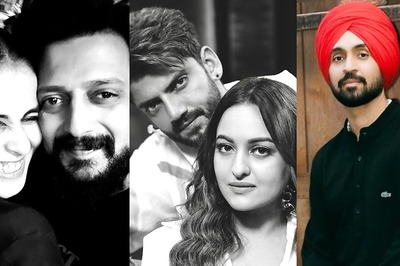
views
Facebook-owned communication giant WhatsApp and the Startup India initiative today rewarded five early-stage Indian startups with $50,000 (~Rs 35 lakh) each. The initiative was not held in a typical investment-based funding process, and is instead a part of WhatsApp's efforts to support rising Indian startups that are using technology in the Indian context to take on various fields. As a result, the Startup India-WhatsApp initiative held today does not involve an equity holding or contractual agreement between the chosen startups, and the world's most popular internet-based communication service.
Speaking at the press roundtable following the day-long presentation and award event, Abhijit Bose, India head of WhatsApp, stated, "There is no obligation, one way or the other. The goal here was to identify, highlight and to the best that we can help companies that are at this stage of their journey. They have access to us, whether it be mentoring or even other resources and help that we can give, and that involves all the startups that applied, and not just the ones that won."
Notably, WhatsApp's parent company Facebook also invested very recently in Meesho, a resale-based e-commerce startup. Its founder and chief executive, Vidit Aatrey, also presented a keynote, stating Meesho's journey from the initial stages. The move highlights Facebook and WhatsApp's increasing efforts in localising their India presence, by underlining their position as a Big Tech firm.
The recipients of the Startup India awards were Melzo (affordable virtual reality tech), Minionlabs (Machine Learning-based electricity optimisation), Medcords (end-to-end healthcare digitisation), Gramophone (end-to-end agronomic intelligence) and Javis (conversational AI engine for businesses), each of which offer use cases that are specific to the Indian context. Given the premise of the event, it is important to note that WhatsApp's involvement in the operational front was not one of the critical factors behind the awardee startups.
Explaining this factor, Bose said, "You need not have to be on WhatsApp to be a part of this ecosystem. These startups are interesting, innovative and unique in their own ways, and that is kind of the gist of it. Melzo, for instance, is a very good example of deep tech solved in an Indian context. VR is present all over the world, but the way they explained it is something that an Indian would understand, in terms of the bandwidth, the phone that we are using, and the use cases of it. That's a fantastic example of the innovation that is happening here."
Bose further added that the ability to solve contextual problems is what he looks forward to in startups making it big in the Indian industry right now. He stated, "Companies around the world should look out for Indian product companies now -- for the companies that are solving issues here would help each other in solving issues in other parts of the world."
WhatsApp and Facebook are the latest among Big Tech firms to have picked up a stake in Indian e-commerce firms and startups. Google's parent company, Alphabet, already owns a part of e-commerce giant Flipkart, while its startup investments have included the likes of Halli Labs and Dunzo. Amazon Inc, which itself is one of India's largest e-commerce players, has also invested in startups such as QwikCilver. With Big Tech firms increasing their support of the Indian startup ecosystem, it will be interesting to see how the industry grows, over the next decade.




















Comments
0 comment